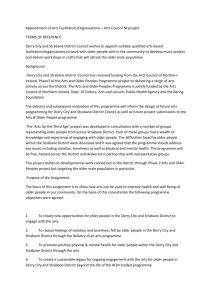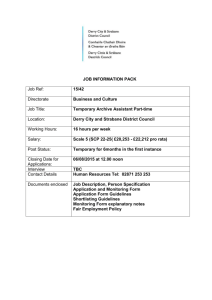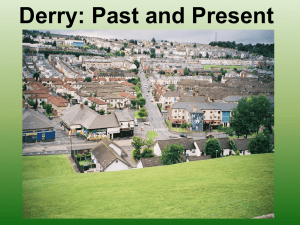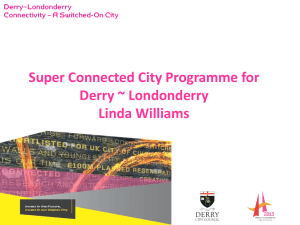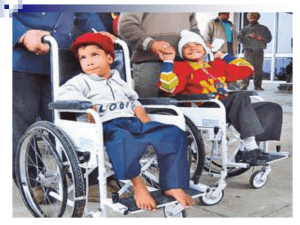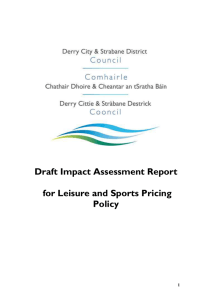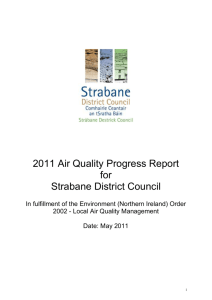Derry City and Strabane District Community Planning Workshop
advertisement
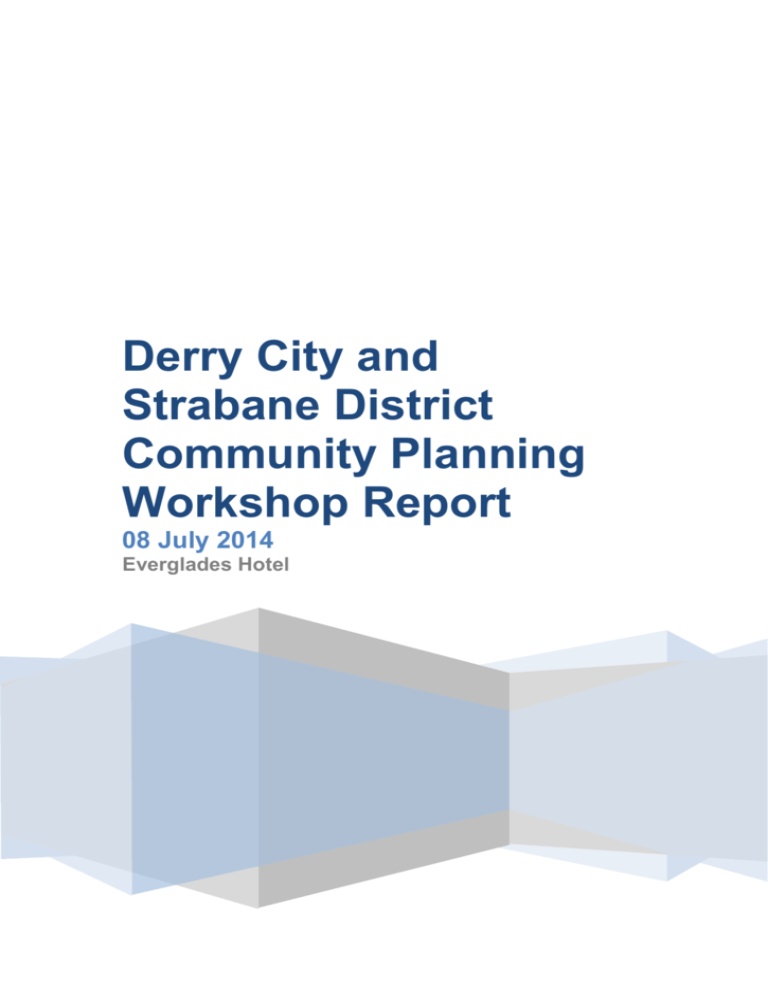
Derry City and Strabane District Community Planning Workshop Report 08 July 2014 Everglades Hotel Derry City and Strabane District Community Planning Workshop Report 2014 This Report was produced by Community Places, 2014. 2|Page Derry City and Strabane District Community Planning Workshop Report 2014 Derry and Strabane Community Planning Workshop 1. Introduction This is a report of a Community Planning Workshop held on 08 July 2014 at the Everglades Hotel. The workshop was facilitated by Community Places as part of its contract with the Department of Environment to support new councils in preparing for Community Planning. The event was open to all to attend and a full list of participants is included at Appendix A. The workshop included presentations on and discussion of key elements of Community Planning in Northern Ireland and good practice from Scottish Community Planning practice in Dundee and East Ayrshire, presented by Community Places. The participants also engaged in discussion and reflected on their experience of partnership working and engagement across the new council area. 2. Workshop Objectives To develop a common understanding of the legislative foundations for Community Planning. To discuss the opportunities which Community Planning offers. To discuss our experience of planning and working together in partnership. To inform a community planning process for the new Council area. To identify and discuss possible next steps. 3. What we know about Community Planning The workshop participants completed a Table Quiz which covered key elements of the new legislative requirements of Community Planning, including the roles and responsibilities of Councils, Community Planning Partners and Departments; Community Consultation requirements; and the statutory link between the Community Plan and the Local Development Plan (landuse or spatial plan). 3|Page Derry City and Strabane District Community Planning Workshop Report 2014 4. Table Discussions Participants were asked to reflect on their experience of planning and working together in partnership and to identify the benefits and challenges of partnership working. A summary of participant feedback is presented below – the detailed responses from each table can be found at Appendix B. Each of the 16 tables contributed feedback on: How Community Planning can help to maximise the benefits and address the challenges of partnership working. Participation and Community Consultation The Community Planning process will enable community representatives to be an equal partner alongside the statutory agencies. Better and improved engagement, with better links between statutory partners and policy. Inclusivity and ensuring that everyone is involved. We aren’t starting from a blank sheet. Community involvement will be constantly on the agenda. How will the Council deal with issues of geographic isolation across the new Council area? Community Planning Process Community Planning offers an opportunity for a shared vision between regional and local stakeholders. The creation of the new council provides an opportunity to move forward with Community Planning positively and at a greater scale. It offers a statutory framework with transparency and openness. Accountability is essential. We can do more with shared resources. Build on and enhance existing partnership and collaboration and create a new way forward. Manage expectations: what can we do which is both practical and achievable; expectations should not be too high. Enthusiasm and an opportunity to build capacity of all partners. The process provides a timely review of The One Plan. We are not starting from afresh but have the opportunity to review and look at outcomes which are shared and where there is responsibility to deliver. Removes duplication, strong focus on outcomes as a benefit, maximise existing resources and produce a clear articulation of community needs. Working Together Working and planning in partnership provides a wider knowledge base and expertise to tap in to. Regular reporting will be important but who will be held responsible if statutory agencies don’t play their full part? What does ‘have regard to’ mean? 4|Page Derry City and Strabane District Community Planning Workshop Report 2014 It provides an opportunity to introduce a new definition of partnership: one which has shared responsibility avoids gate-keeping and is not just about everyone having ‘their slice of the cake.’ Shared knowledge and expertise, reduced duplication, greater accountability and ownership and community ownership. Workshop attendees were also asked to discuss and feedback on: How do we build on existing engagement processes in Derry and Strabane? Strengthen Existing Infrastructure Look at existing community infrastructure and strengthen this to make sure it is inclusive and is able to be active in the Community Planning process. Ensure rural proofing – share experience and learning in rural areas and areas outside of Neighbourhood Renewal. Skill communities in rural areas so that they can be equal partners. There has been a lot of consultation exercises e.g. Citi Scope as part of the One Plan which can be built upon. We should excite people about Community Planning. Different partnerships already exist, we should expand on good practice and what has worked e.g. Policing and Community Safety Partnerships; defined need for Youth and Language officers etc. To improve on existing engagement. Assessing what is working – use of Citi Scope to build baseline foundation; new opportunity for everyone and to get buy in from the community. Review and use existing structures. Embed simple structures. Build on scoping exercises and look at partnerships that have developed more informally this may be a good avenue to strengthen community development if given the right support. Do we need to consider whether the One Plan and Future Search exercises need to be re-visited? Inclusive, Meaningful and Innovative Engagement Utilise Social Media tools for engagement, to ensure widespread engagement processes. Designate champions who are enthusiastic and can show leadership and drive. Capacity building. There is a need for engagement at the local level through local forums. Engagement may need to be different for rural and urban areas. We need to mainstream and not just focus on Neighbourhood Renewal areas. We need to focus in areas where people don’t get engaged. Better communication, especially with the ‘hard to reach’ (old, young, vulnerable) Meaningful engagement which provides the right information, is reliable, accurate, and develops a shared understanding of engagement. Learn from the Scottish National Standards of Community Engagement. Develop capacity from what is already out there – variety, not one size fits all, respectful, creative and two way. 5|Page Derry City and Strabane District Community Planning Workshop Report 2014 Like council to clarify the engagement process, especially for rural groups. We would like to see something written down about how council will do that. Be creative about how we collect data and feedback e.g. arts/drama/ culture. Engagement linked to accountability and reporting back. What are the issues that need to be addressed? Sounding board? New Working Relationships There will be new engagement for councillors, a new relationship and greater insight to Education, Health, Roads, and Planning. Councillors will be stronger partners and will no longer be looking on. All partners need to be prepared to embrace change and a different culture of working. Has to be clear communication to ensure awareness raising and involvement through to implementation. This needs to be properly resourced. Potential to re-examine relations: retain, develop and build new relations which are fit for purpose. Greater involvement of the private sector. 5. Concluding Remarks and Next Steps Reflecting on the workshop content, John Kelpie made a number of closing remarks: The Table Quiz has highlighted the startling statistics affecting the new Council area e.g. 40% of 16- 74 year olds are economically inactive. He stated that it was as a result of such statistics that the new process of Community Planning had to succeed. The mood in the room supports a focus on ‘Outcomes’ in the Community Planning process. This would involve: agreeing on outcomes for the new council area and then identifying what actions are required to lead us to those outcomes. A process which is evidence based, with baseline information and one where we can measure progress and know that we are moving things forward. It will be important to continue to build on collaboration both within the region and cross border. There is a presumption across the 11 new councils in favour of collaboration and seeking the right partners to collaborate with to deliver greater impact. While collaboration is one thing, statutory participation is another issue that needs to be resolved. We are stating clearly that whether or not there is a statutory obligation we will work with partners and also engage with statutory partners through the Partnership Panel. Today it was prompted, how will the Council deal with Community Planning? But it is not just about Council, Council will not design this process alone – we want to codesign the process with everyone in the room and others who were not able to be here today. It should be simple in structure and form, understandable to our ratepayers and businesses – not a complex structure. 6|Page Derry City and Strabane District Community Planning Workshop Report 2014 Engagement will be essential and someone asked today about ‘rural-proofing’ that sounds like something which is reactive. We want to make sure that we build rural proofing into the process from the start. Next Steps The proposed next steps were then outlined by Mr Kelpie: A Workshop Report will be circulated to all participants. A second workshop will be held on 23 September 2014 where we will hear more about experience from Scotland. We are starting the process here early, only three weeks from the formation of the new Council, and the new council and our councillors ‘get’ Community Planning. We would like to hear your suggestions on others who should be invited to attend this second workshop. At the workshop we want to begin to explore and design what engagement in the process and what the structures should look like and how we can overcome the challenges of geographic isolation and build our collective approach to Community Planning. It is proposed that there will be a third workshop in November 2014 to discuss Community Planning process proposals. We will be looking at our own structure, governance and corporate plan and we will be aligning all of these to the emerging outcomes of the Community Planning process. Community Planning is at the top of our agenda and will be embedded in our work going forward. Community Planning will make a difference, it is a ‘game changer’ and we must embrace the process. The Council is very positive about leading on the process and we look forward to working with you all to co-design Community Planning for the new council area. 7|Page 2014 Derry City and Strabane District Community Planning Workshop Report Appendix A: Participant List Name Company Name 1. Adrian Loughery Derry Healthy Cities 2. Aileen McGuinness BBHF 3. Alan Bresland Councillor 4. Alan Young Translink 5. Alison Wallace Waterside 6. Angela Dobbins Councillor 7. Angela Hughes Ilex 8. Austin Kelly Dennet Interchange 9. Brendan Bonner PHA 10. Brian O’Brien Barry O’Hagan Rural North West Community Support Interim Strategic Director Development DCC 12. Bronagh Donnelly Action for Children (CYPSP) 13. Caroline Devlin RAPID 14. Cathy Mullan H & SWI Manager PHA 15. Charles Culhoun TRIAX 16. Christina McCallion Chamber of Commerce 17. Christopher Jackson Councillor 18. Christopher Kerr NW Volunteer Centre 19. Ciara Ferguson Greater Shantallow area Partnership 20. Ciaran Doherty Ilex 21. Clare Hood ILEX 22. Claudine Christie Community Places 23. Colin Devine NWCN 24. Colly Kelly SF 25. Colm Bradley Community Places 26. Colm Doherty Ilex 27. Gus Hastings Councillor 28. Craig Barr International School for Peace Studies 29. Darren Kirby Greater Shantallow area Partnership 30. David Ramsey Councillor 31. David Wallace Ilex 32. Derek Hussey Councillor 33. Derek Reaney Ulster Scots Agency 34. Des Gartland Invest NI 35. Donna McAnenny Women’s Centre 36. Dorothy McElwee NWRC 37. Dr Eddie Rooney PHA 38. Drew Thompson Councillor 39. E Montgomery Irish Society 40. Eamon O’Kane Derry Healthy cities 41. Eddie Friel University of Ulster 42. Ellen Cavanagh Derry City Council 43. Emmet Lynch Derry Healthy Cities 11. 8|Page Derry City and Strabane District Community Planning Workshop Report 2014 44. Eoghan Harkin Derry Healthy Cities 45. Eric McGinley Councillor 46. Fionnuala McKinney WHSCT 47. Gary Middleton Councillor 48. Geraldine Doherty TOTH 2010 49. Gerard Diver Councillor 50. Gerard McCleave Ilex 51. Gina Gallagher Strabane LGBT 52. Hilary McClintock Councillor 53. Hugh McNickle Ilex 54. Ian Snowden Inspector Donna Bowden DSD 56. Jacqueline Whoriskey DCC 57. Jacqui Barr International School for Peace Studies 58. Janine Sayers Strabane & District CAB 59. Jim McKeever Councillorl 60. Jim Roddy City Centre Initiative 61. Joanna McConway DCAL 62. Joanne Boyd Derry City Council 63. Joe Lusby Western Trust HSCNI 64. John Boyle Councillor 65. John Kelpie Derry City and Strabane District Council 66. John Kerr Strabane District Council 67. Judith Gray Ilex 68. Karen McFarland Strabane District Council 69. Karen Philips DCC 70. Karina Carlin Councillor 71. Kenny McFarland Villages Together 72. Kevin Campbell Councillor 73. Kieran McGuire Councillor 74. Laura Hamilton Derry City Council 75. Linda Watson CNDA 76. Louise O’Kane Community Places 77. Manus Deery NIEGA 78. Maoliósa McHugh Councillor 79. Margaret McLaughlin Dennet Interchange 80. Martin Reilly Councillor 81. Mary Casey Amelia Earhart Society 82. Mary Hamilton Councillor 83. Mary McLaughlin Walled City Partnership 84. Mary Thornton Rural Support Network 85. Mel Higgins Ilex 86. Michael Gallagher Ilex 87. Nuala Crilly NWCN 88. Odhran Dunne Visit Derry 55. PSNI 9|Page Derry City and Strabane District Community Planning Workshop Report 2014 89. Oonagh McGillion DCC 90. Paddy Cosgrove Strabane District Council 91. Paddy Mackey WELB 92. Patricia Bray Disability Action 93. Patricia Logue Councillor 94. Patrick O’Doherty Strabane District Council 95. Patsy Kelly Councillor 96. Patti Holly Martin McCrossan City Tours 97. Paul Donnelly DARD 98. Paul Fleming Councillor 99. Paul Gallagher Councillor 100. Paul McNaught DSD – NWDO 101. Paula Donnelly Strabane District Council 102. Pauline Campbell DSD – NWDO 103. Pearce Moore Nerve Centre 104. Peter Caldwell YMCA 105. Prionchas McCaughey DOE Planning 106. Rachelle Craig Derry City and Strabane District Council 107. Rhonda Hamilton Councillor 108. Richard Osterhus Derry City Council 109. Rita McDonald L.C.A 110. Roisin Farren RAPID 111. Ronan O’Donnell Walled City Partnership 112. Rosalind Young Derry City Council 113. Rosie McCann FWIN 114. Ruairí McHugh Councillor 115. Sandra Duffy Councillor 116. Seamus Ward BB Health Forum 117. Sharon Maxwell Strabane District Council 118. Sharon Polson Invest NI 119. Shauna Cusack Councillor 120. Siobhan Sweeney PHA Health & Wellbeing Improvement 121. Stephen Gillespie Derry City Council 122. Sue Divin Derry City Council 123. Susan Doherty Strabane District Council 124. Susan Mullan Derry City Council 125. Sylvia Burt Rural Support Network 126. T Cooper SF DCC 127. Teresa Bradley DCC 128. Thomas Kerrigan Councillor 129. Tina Gillespie Derry City Council 130. Wendy Gibbons Outer West Neighbourhood Renewal 131. William Lamrock YMCA 10 | P a g e Derry City and Strabane District Community Planning Workshop Report 2014 Appendix B: Participant Feedback Discussion 1 Benefits of Planning and Working in Partnership Enhanced understanding of pressures and issues. Reduce potential duplication and improve co-ordination. Attaching names to actions. Efficiency and delivery – people of one mind. Integrated approach to delivery – joined up. Report, review, accountability. Skills and capacity building. Local Influence. Potential integration at strategic level. Process has started and there is an enthusiasm to make it work. Build on experience of the LSP, One Plan, Neighbourhood Renewal. Local political engagement and political leadership. Community Services experience and links. Lack of duplication/complementarity. Service user’s satisfaction. Better more relevant services. Learning from each other - sharing knowledge/skills/resources/expertise/ideas. Better knowledge and understanding of each other’s needs and the needs of the community and people. Creates innovation. Opens communication leading to better/stronger relationships – breaks down barriers. Advocacy. Buy in/ownership. Feeling involved. Dissemination of information. Challenge, creativity. Stronger partnerships. One vision – collective. Inclusion. Bottom up approach that ensures community engagement/involvement from the start. Opportunities to start fresh. More ideas. Common goal. Solve problems/sharing learning. Clear direction. Build relationships and trust. Spins off into spheres of work. Creative. Collaborative advantage. Empowering people. Greater synergy. Better use of limited resources available. Identifying and promoting better practice. Encouraging people to up their game. Better, improved outcomes/services/wider perspectives. Stronger voice, speaking together e.g. funding/lobbying/collaborating. Many hands make lighter work – interagency working. Bringing all the main players together in one room. Shared knowledge. 11 | P a g e Derry City and Strabane District Community Planning Workshop Report 2014 Grass roots involvement. Avoid duplication and encourages complimentarily. Improved performance and Improved probability of success. Communication. More accountability. Agreed priorities to direct resources (better). Better/improved engagement. Links between strategies/agendas. Maximise resources. Get local things done. Buy-in ownership (cross community). Capacity building. Adds more weight. Right people. Neighbourhood Renewal – cross sectional – all voices heard – bottom up approach. Stronger voice – gains consensus going forward. Economically feasible. Collaborative approach – stronger together. Clarity for service user as to who to approach. Consistency of approach. Better quality policies. Challenges of Planning and Working in Partnership Funding. Management of process too many stakeholders. Require input from certain people – if not in attendance then what? Getting beyond usual suspects/gatekeepers. Pre-determined themes. Limited authority to influence/drive change. Dovetail with other strategies. Rural vs. Urban (65% rural population). Competition between communities and political opinion. Egos, values, personalities, respect, culture. Equity and equality. Participation, sustainability – voluntary vs. requirement. Local vs. strategic commitment, fit and priorities. Capacity Building/time/ commitment. Total lack of co-terminosity. Manage expectations. Resources. Continued engagement and energy. Pace of Change. Ensuring community involvement. Perceptions of hierarchy. Inclusion. Departmental participation and resourcing. Relationships and Trust. Creating true partnership and maintaining commitment. Leadership. Conflicting priorities- want vs. need. Culture of change. Isolated community – engagement. Longer decision making. Keeping all involved. Consensus/agreement. Effective partnerships. Defining parameters – keeping focus. Clear roles and responsibilities. 12 | P a g e Derry City and Strabane District Community Planning Workshop Report 2014 Individual v organisation. Sustainability. Transfer of knowledge skills. Agreement. Difference of opinions. Keeping momentum and motivation going. Ensuring that the correct partners are around the table. That the partnership is productive and not just a talking shop. How to agree/reach agreements. Power/equality/partnerships never equal. How to get community involved. Hidden agendas/conflicts of interest. Continuous partnership building/trust. Communication. Glory hunting. Gate keeping. Internal controls. Logos. Not always having adequate expertises and how to make it work to ensure involvement . Conflict of objectives. Getting consensus on implementing change. Duplication of effect. Risk of poor communication. Personality clashes/exclusion. Unhealthy competition. Introvert/extrovert – challenge. Risk of smaller entities being left behind. Too many cooks spoil the broth. Bigger organisations tend to move slower. Non co-operation/non participation. Learning to compromise. Securing resources. Suspicion/mistrust. Robust monitoring. Achieving results. Need for accurate evidence based information. Geography urban and rural. Streamlining. Duplication. Agreeing local priorities. Getting everybody there and turning up. Carry out agreed actions/deliver. Agreeing roles and responsibilities. Identify key stakeholders. Agreeing priorities/vision. Work together for community aims. Geographical isolation. Council structure. Location of meetings/services. Political co-operation. Improve educational achievement. Reduce unemployment. Governance and accountability. Lack of statutory obligation /central government buy-in. Aligning local priorities with central government policy. Prioritisation. Implementation. Timeframes – two speeds. Power balance – shared understanding, common ground. Change mindset/relationships. 13 | P a g e Derry City and Strabane District Community Planning Workshop Report 2014 Composition – balance of power of group. Lack of shared understanding of partnership working. Lack of resources – time, people, money. Failure of a partner to deliver. Lack trust and commitment. Failure to plan and policies terms of references. Lack of consistency of personnel and ownership. Different partners – different aims. Unrealistic expectations. Cynicism. Status/authority of partnership is ambiguous. How does Community Planning provide help to maximise the benefits and address the challenges? Planning from bottom up – can influence what happens. Established experience of community engagement. Already established community sector may lead to expectations that are too high. Reassure people in rural areas, balance expectations, rural proofing but also consider urban needs. Joined up thinking. Identification of agreed priorities/ synergy of plans. Sharing of expertise/ resources/ learning. Better use of resources. Joint responsibility. Allow for earlier monitoring of outcomes/ impact. Feedback on service provision/ experience. Signposting and awareness of services. Active and informed Community and Voluntary Sector. Principle of open invite for involvement at start. Statutory duty on all Departments to participate. Given that the Act requires participation and community consultation – community representatives will feel as an equal partner in a statutory process with some teeth. Statutory framework- it has to be done! Transparency/ openness. Accountability. Shared Resources – make existing resources do more. Build and enhance existing partnerships and collaboration. Relationships – opportunity to rebalance and create a new way forward. Greater responsibility to engage – duty – local involvement. Defines partners, issues. Transparency and accountability – communication. Assisting in prioritising resources. Resource sharing – remove duplication. Shared vision and responsibility. (encompassing communities citizens local stakeholders regional stakeholders). Ensures that community planning is constantly on the agenda and on people’s minds as it is now enshrined in government.. Ensures co-ordinated approach from all statutory partners. Ensures community involvement (but also a challenge – how do you ensure community involvement?). Gives the opportunities to challenge inaccuracies and deal with them and put appropriate measures in place. Provides opportunity to build a community plan that will benefit the Derry/Strabane area (a holistic approach that looks at all areas of development). Statutory participation. Outcomes focused. Regular reporting. Learning from best practice. Adopting a “can do” approach. Increased communication provides a framework to allow community ownership and makes everybody involved accountable for their piece. 14 | P a g e Derry City and Strabane District Community Planning Workshop Report 2014 By working together. Value partners. To name the new council. To ensure equality between urban/rural and city councillors. Everyone engaged from concept to delivery – implementation. Cross sectoral representation. Ensuring agreement at key milestones. Achievable outcomes – shared and agreed. Sharing experience and expertise. Targets – clear. Timely – fresh start. Change mindset. Address overarching issues (greater scale). Agreement – education and training on partnership required. Bigger range of agencies /organisations/groups. Ensures collective approach. Allows communities to make their needs clear. Maximises resources – need better measurement/evaluation of existing inputs. Status of partnership and role of members set out in law. Discussion 2: How do we build on existing engagement processes in Derry and Strabane? Embrace this change for the better. Promotion and communication to all citizens. Common goals and outcomes that people can sign up to. “Citi- Scope” Survey used as baseline foundation. Let residents know what RPA is all about. Use Social Media. Certainty in DCC ‘One Plan’ – how do we revisit or review and extend? Local Engagement: building on Partnership Boards, local forums, rural networks, enterprise agencies, interface forums etc. Ensure effective engagement through the transition arrangements/discussions. Transition committees – super council- clear message to support engagement and community planning. Build on Peace Partnerships and Rural Development Partnerships. Build on the strong Community Services Sectors/services within the two councils. Build on the existing infrastructure which exists through partnership boards. What relationships will exist after the formation of the new Council? Re-evaluate who the required stakeholders will be. Contract based relationships – retain, create, develop relationships that are fit for purpose. Make the rate player aware of services that exist in the district. Provision of central information point for Council and other statutory agencies. Consistent service delivery. Uniformity. Assess what is already there and working. Rural proofing. How will the Council engage with the community and voluntary sector? How was this group constituted and how does it reflect the community? Less than 1/3 reflects the community here today, who was invited? Wide ranging engagement. Recognition that there are strong and positive structures already in place e.g. Neighbourhood Renewal, City Strategy Board, Chamber of Commerce, Area Partnerships etc. Map and review (SWOT) these, fine-tune and reinvigorate dormant structures e.g. Civic Forum. Communications Strategy is crucial to target all audiences and stakeholders and to ensure their awareness and involvement – implementation of the strategy is the key challenge, resource it properly. Specific area/ neighbourhood based representation is key with local input and local hubs/area forums/fora. 15 | P a g e Derry City and Strabane District Community Planning Workshop Report 2014 Integration/co-ordination of consultation exercises. Co-ordination of communication messages. Highlight benefits – promote engagement – respond. Capacity building to promote wider engagement. Citi-scope – citizen portal – forum – apps? Ensure that it is done right from the start – Have enthusiastic/energetic champions to ensure the successful partnerships that are already built are sustained and built on. Consensual Development Plan – based on needs in the community – directed from the involvement of all in particular the community groups/residents etc. Good communication links – store information – utilise media more effectively. Co-operation – value existing partnerships and the existing engagements that have been developed. Two way – top down and bottom up. The existing engagement to be seen as the foundation to build on to improve communities moving forward in the future. Evolving process – constantly reviewing it. Good leadership. Designated “Community Plan Champions” Involvement of all including residents/communities not affiliated to any group or partnerships. Inclusivity. Workshops – togetherness. Clear and effective communications strategy – appropriate for respective. groups/communities, be creative, but also sectorally – you don’t have to be sitting at the table to participate – resource the communities strategy. Consider gaps e.g. BME voice to make sure all communities of place and communities of interest e.g. children and young people can be engaged and making it relevant. Public Information /media/newsletter. Civic events e.g. good relations events. Forum meetings/public meetings. Structures – enchanting and improving these/building in flexibility. Report back – building in accountability. Partnerships – identify and expand best practice e.g. youth officer, language officer PCSPs – stakeholders/agency buy in. Urban/rural – equity and equality to be underpinning principal. Engagement at community/local level – How good currently? Engagement of councillors – new relationship especially with planners. Need local forums – grass roots level, geographical e.g. rural, urban areas. Mainstream c/v – not just Neighbourhood Renewal areas. Council services need to be delivered in local areas – close to people. Councillors and officers will have a new insight/influence to education, health, roads, policing etc. Engagement should be ongoing – not just at outset. Learn from and build on consultation from “one plan” Incorporate existing strategic plans. Expand on the learning of NHR – i.e. rural and non NHR areas. Make sure right people are involved across sectors. One Plan/Regeneration Framework. Neighbourhood Renewal/Rural Regeneration Plans; Investing for health, Public Health Partnership. (Brought together under one plan to check the currency of content/duplication/overlap/gaps). Diversity – build off (Reshape the cultural process for engagement to capture the wider area to be inclusive – especially Rural/Urban split and access to services) Use of new technology to get input to and deliver services out. Need to ensure equity across geography/age/disadvantaged groups. Need “real” feedback from residents not groups. Harness the skills and knowledge out there already – introduce creativity in the data collection process. Improve existing structures e.g. local delivery system, strategy board, regeneration forum. Utilise and build on citi-scope to meet needs of Community Planning. Encourage greater ownership and responsibility for delivery. Harder to reach people – old, young vulnerable. Are structures in place – fairly simple. Review and improve and imbed Greater involvement of private sector and central government. Engagement relies on having information (accuracy, format, reliability). 16 | P a g e Derry City and Strabane District Community Planning Workshop Report 2014 Shared understanding of engagement – purpose – outcomes (not tokenistic!!) (Whose responsibility??) Engagement principles (Scotland). Varied – simple – cross sectoral – resourced. Respectful – flexible – creative – two way. . Help informal partnerships become more formalised. Look at best practice models that already exist. Ensure section 75 groups are around the table – not just tokenism. Training and support systems should be made more available to harder to reach groups. Fully accessible meetings /venues/materials. More equity than just equality. Try and eradicate negative engagement. Ongoing model training and evaluation of time bound groups. Fully meaningful engagements with proper outcomes and feedback. Tension between official stats and community perception of issues. Use one plan/future search as basis going forward. On-line resources – sounding board. Need to manage expectations of communities. 17 | P a g e
